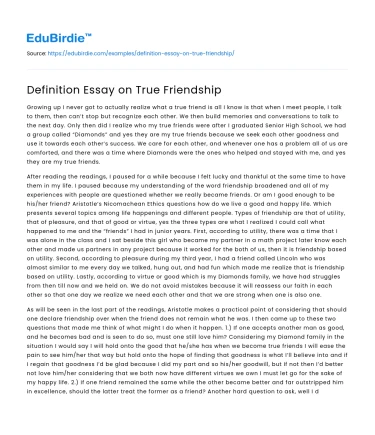Introduction
Friendship is a multifaceted concept that has been explored and defined in myriad ways across different cultures and ages. True friendship, however, transcends the simple exchange of pleasantries and shared activities; it is an intricate bond built on mutual respect, trust, and empathy. This essay seeks to delve into the profound nature of true friendship, examining its defining characteristics and its pivotal role in personal and social contexts. Aristotle once remarked, "Friendship is a single soul dwelling in two bodies," highlighting the deep connection that true friends share. In an age dominated by virtual connections and social media, understanding the essence of genuine companionship is more crucial than ever. This essay will explore the elements that constitute true friendship, differentiate it from superficial relationships, and discuss its impact on individuals and society. Through this exploration, we aim to provide a comprehensive definition of true friendship, supported by scholarly insights and real-world examples.
The Characteristics of True Friendship
At the heart of true friendship lies an unwavering trust and mutual respect. These elements are crucial in differentiating genuine friendships from mere acquaintances or superficial connections. Trust in friendship means that individuals feel secure in sharing their thoughts and emotions without the fear of judgment or betrayal. In the words of Ralph Waldo Emerson, "A friend is one before whom I may think aloud." This level of openness fosters a bond that endures various challenges and transcends time and distance. Empathy, the ability to understand and share the feelings of another, further strengthens this bond. A true friend is someone who not only listens but also empathizes, offering comfort and support during difficult times. Additionally, true friendship is characterized by a balanced give-and-take dynamic, where both parties are equally invested in the relationship. This reciprocity ensures that the friendship remains healthy and sustainable, avoiding the pitfalls of one-sided relationships that can lead to resentment and breakdowns.
Save your time!
We can take care of your essay
- Proper editing and formatting
- Free revision, title page, and bibliography
- Flexible prices and money-back guarantee
The distinction between true friendship and superficial relationships is often evident in times of adversity. Superficial connections may falter when tested, as they lack the depth and resilience found in true friendships. According to research conducted by the University of Kansas, it takes about 200 hours to form a close friendship, emphasizing the time and effort required to build and maintain such a relationship. This investment is often absent in superficial connections, which tend to prioritize convenience over genuine commitment. In contrast, true friends are willing to make sacrifices, putting their friend's needs above their own when necessary. This selflessness is a hallmark of true friendship, reflecting the deep affection and loyalty that underpin these relationships. Consequently, true friendship is not merely about shared interests or experiences but about a profound and enduring connection that enriches the lives of those involved.
The Impact of True Friendship on Individuals and Society
The significance of true friendship extends beyond personal satisfaction; it plays a vital role in individual well-being and societal cohesion. On a personal level, true friendship provides emotional support, enhancing mental health and resilience. Studies have shown that individuals with strong social connections are less likely to experience depression and anxiety. The sense of belonging fostered by true friendship can act as a buffer against stress, promoting overall psychological well-being. Furthermore, true friends often serve as sounding boards, offering constructive criticism and encouragement that facilitate personal growth and self-improvement. In this way, true friendship contributes to the development of a well-rounded and self-aware individual.
On a societal level, true friendship fosters social cohesion and community resilience. Communities characterized by strong interpersonal relationships are better equipped to navigate challenges and adapt to change. This is particularly evident in times of crisis, where the presence of supportive social networks can significantly impact collective recovery and adaptation. Additionally, true friendship promotes values such as empathy, cooperation, and altruism, which are essential for harmonious coexistence. By nurturing these values, true friendship contributes to a more compassionate and inclusive society. However, it is important to acknowledge the counter-argument that the idealization of friendship can lead to unrealistic expectations and disappointment. While true friendship is indeed valuable, it is essential to recognize and accept the imperfections inherent in all human relationships. By doing so, individuals can cultivate more realistic and fulfilling friendships, ultimately enhancing their personal and social well-being.
Conclusion
In conclusion, true friendship is a profound and multifaceted relationship characterized by trust, empathy, and reciprocity. It transcends superficial connections by fostering a deep and enduring bond that enriches the lives of those involved. True friendship not only enhances individual well-being but also contributes to societal cohesion and resilience. While it is important to acknowledge the imperfections inherent in all relationships, the pursuit of true friendship remains a worthwhile endeavor. As we navigate an increasingly interconnected yet often impersonal world, understanding and valuing the essence of true friendship is more crucial than ever. By fostering genuine connections, we can create a more compassionate and supportive society, where individuals thrive both personally and collectively. Ultimately, true friendship is a testament to the human capacity for love, understanding, and mutual support, offering a beacon of hope and connection in an ever-changing world.






 Stuck on your essay?
Stuck on your essay?

